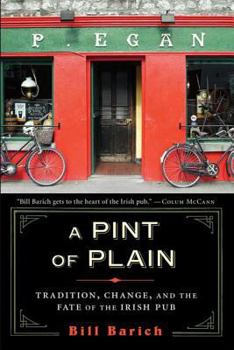A Pint of Plain: Tradition, Change, and the Fate of the Irish Pub
Select Format
Select Condition 
Book Overview
"Shhhhhh Don't tell, but this is really a book about globalization, not about yer only man' (i.e., the well-pulled pint of porter). With Oirish' pubs cropping up in every burg and burb, what has... This description may be from another edition of this product.
Format:Paperback
Language:English
ISBN:080271062X
ISBN13:9780802710628
Release Date:February 2010
Publisher:Walker & Company
Length:242 Pages
Weight:0.50 lbs.
Dimensions:0.7" x 5.6" x 8.2"
Customer Reviews
3 ratings
A warm glimpse into Irish drink and daily living
Published by Thriftbooks.com User , 15 years ago
A PINT OF PLAIN: TRADITION, CHANGE AND THE FATE OF THE IRISH PUB arrived too late for St. Patrick's Day feature in our March issue but deserves a place in any general lending library strong in Irish history, culture and food and drink. After meeting an Irishwoman in London and moving to Dublin the author began seeking a traditional Irish pub to be 'his'. His search offers views of a bygone Ireland, modern Irish culture, blends in literary references, and offers a warm glimpse into Irish drink and daily living. Highly recommended.
"Fairytale Ireland" is nearly dead and gone, despite the Tourist Board
Published by Thriftbooks.com User , 15 years ago
"Drink is a good man's weakness." Proverbial wisdom Barich passes along during his personal and historical tour of Irish pubs. "Fairytale Ireland" may be marketed under the "Irish Pub Concept" pre-fab faux-antique corporate chains, as traditional pubs decline and decay under stricter drunk-driving laws. These in turn necessitated by the commuters ripping along (Barich estimates a fifteen-fold increase) rural roads as tract homes tear up fields for the Celtic Tiger's rapacious tail. And, such new residents don't frequent the "local," preferring their Carlsberg or Coors in cans from the logoed franchises that replace the family-run stores in the market towns overwhelmed by the blow-ins from the cities and all over the world. So the cycle continues, and Long Island-born, California-residing Barich, now moved himself to Dublin, tells the tale of a slow death to civility, custom, and charm. About half his book takes place in Dublin, and he tells each chapter set there with grace and pace. He knows how to veer from his main story into anecdotes and byways before returning to his narrative, and this relation of his saga reflects well how a tale's told by a teller in a pub. He classifies the remaining pubs into trophy bars, pitched for tourists more than the neighbors and often based on their venerable status; pleasant but less distinguished corner houses; and corporate chains, which in Ireland appear to erase their "tradition" for a streamlined gentrification, even as abroad you find such enterprises as a hundred "Harrington & Sons" fake pubs saturating the Italian consumer. Such globalization leads to Irish rejection of Guinness as an old man's heavy stout. Younger Irish follow their Anglo-American cousins in choosing more wine, and lighter German or American beers to quaff, often at home rather than in the company of those who at many pubs tend to be older, more insular, and stodgier. Younger Irish appear too to be suburban rather than urban in their tastes; immigrants replace the stereotypical publican, and such changes are more than cosmetic. They, for Barich, represent the decline of what Perry Share calls the "third place" of camaraderie outside home or work that the pub has long represented, the true public house. The erosion of such ties for many Irish shows their fragmentation along Western lines as they retreat from the communal, village, farm-based culture into a sprawl of strip malls, semi-detached estates, and endless commutes far from the small towns where the suburbs now stretch to and supplant. Like farmers, publicans find few of the next generation willing to take on the intensive labor demanded to make a living. "It's been said that a publican must be a democrat, an autocrat, an acrobat, and a doormat," Barich observes (21). He's good at summing up, in the second half, his encounters, or lack of such, in rural Ireland. Outside Sligo town, Barich finds one pub in the middle of a dark nowhere, a remnant of when the pub was also a
Wonderful read!
Published by Thriftbooks.com User , 15 years ago
Wow...I really enjoyed this little book that I picked up more or less as an afterthought. Great writing and alot of fun. I have spent alot of time in Ireland, especially in the past two years - therefore I concur with the author's thoughts on the mass commericalization of Irish Culture (and thus it's decline). Thought provoking and fun at the same time!






